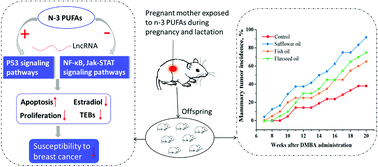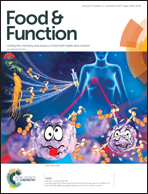Maternal exposure to an n-3 polyunsaturated fatty acid diet decreases mammary cancer risk of female offspring in adulthood
Abstract
Maternal exposure to dietary factors during pregnancy influences the risk of many adult-onset diseases in the later life of offspring. Here, we investigated the effects of maternal n-3 polyunsaturated fatty acid (PUFA) diet on breast cancer risk of female offspring. Pregnant C57BL/6J mice were fed a normal diet (control group), or a high-fat diet rich in safflower oil (SO), fish oil (FO) or flaxseed oil (FSO) (n = 10) throughout gestation and lactation. Their female offspring were fed an AIN-93G diet from weaning. Tumor incidences in offspring induced by 7,12-dimethylbenz[α]anthracene (DMBA) were higher in high-fat groups than in the control group, and were lower in FO and FSO groups than in the SO group. The plasma concentrations of 17β-estradiol (E2), in both pregnant dams and offspring, were significantly lower in FO and FSO groups compared with the SO group. The FO and FSO offspring showed delayed puberty onset, and their mammary glands contained decreased numbers of epithelial terminal end buds (TEBs, targets for malignant transformation) compared with SO offspring. Reduced cell proliferation and increased apoptosis in FO and FSO offspring were observed compared with SO offspring. In line with these changes, maternal exposure to FO promoted the expression of long noncoding RNA (lncRNA) in p53 and apoptosis signaling pathways and inhibited that in NF-κB and Jak-STAT signaling pathways, while FSO promoted the expression of lncRNA in p53 signaling pathways and inhibited that in NF-κB, Jak-STAT and MAPK signaling pathways. In conclusion, maternal exposure to a high-fat diet rich in n-3 PUFAs, both marine- and plant-based, has a protective effect on mammary tumor risk of female offspring in later life.



 Please wait while we load your content...
Please wait while we load your content...